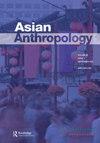Agriculture corporations in rural Japan: fractured mirrors of past, present and future
Q2 Social Sciences
引用次数: 0
Abstract
Abstract In order to increase productivity in national agricultural land and help depopulated villages with aging farmers, current agricultural policy in Japan rewards small farmers who contribute their land to agriculture corporations in which they own shares, have a vote, and labor in the fields for a low wage. Membership is individual, and the sacred link between household and land is virtually cut. Akata, a small village in northeast Japan, has formed agriculture corporations that result in tensions, new alignments, and marginalizations that are well captured by Foucault’s concept of heterotopia: a displacement and regrowth that juxtapose villagers’ pasts, presents, and futures in disruptive yet creative ways. An anthropological analysis unearths social nuances bridging new roles and older connections.日本农村的农业公司:过去、现在和未来的破碎镜子
摘要:为了提高国家农业用地的生产率,帮助人口减少、农民老龄化的村庄,日本现行的农业政策奖励那些将土地贡献给农业公司的小农,他们拥有股份,有投票权,并以低工资在田地里劳动。成员是个人的,家庭和土地之间的神圣联系实际上被切断了。日本东北部的一个小村庄赤田(Akata)成立了农业公司,导致了紧张、新的结盟和边缘化,福柯的异托邦概念很好地抓住了这一点:以破坏性但又创造性的方式将村民的过去、现在和未来并列在一起的流离失所和再生。一项人类学分析揭示了连接新角色和旧关系的社会细微差别。
本文章由计算机程序翻译,如有差异,请以英文原文为准。
求助全文
约1分钟内获得全文
求助全文
来源期刊

Asian anthropology
Social Sciences-Anthropology
CiteScore
1.60
自引率
0.00%
发文量
25
期刊介绍:
Asian Anthropology seeks to bring interesting and exciting new anthropological research on Asia to a global audience. Until recently, anthropologists writing on a range of Asian topics in English but seeking a global audience have had to depend largely on Western-based journals to publish their works. Given the increasing number of indigenous anthropologists and anthropologists based in Asia, as well as the increasing interest in Asia among anthropologists everywhere, it is important to have an anthropology journal that is refereed on a global basis but that is editorially Asian-based. Asian Anthropology is editorially based in Hong Kong, Taiwan, and Japan, but welcomes contributions from anthropologists and anthropology-related scholars throughout the world with an interest in Asia, especially East Asia as well as Southeast and South Asia. While the language of the journal is English, we also seek original works translated into English, which will facilitate greater participation and scholarly exchange. The journal will provide a forum for anthropologists working on Asia, in the broadest sense of the term "Asia". We seek your general support through submissions, subscriptions, and comments.
 求助内容:
求助内容: 应助结果提醒方式:
应助结果提醒方式:


